Can Goats Drink Sprite?
Curiosity may lead us to question what our four-legged friends can consume, and in this case, we find ourselves pondering whether goats can indulge in the fizzy delight of Sprite.
The answer is unexpectedly captivating: No, goats should not drink Sprite.
While it may seem harmless, there are crucial reasons why Sprite and other carbonated beverages are unsuitable for our caprine companions.
However, understanding these reasons and exploring alternative options can ensure the health and well-being of our beloved goats.
So, let’s dive into the fascinating world of goat nutrition and discover why Sprite is off-limits for these remarkable creatures.
Key Takeaways
- Feeding soda to goats can be dangerous and harmful to their health due to high levels of sugar, caffeine, and additives, as well as carbonation toxicity.
- Goats’ digestive system is unique and requires a balanced diet of high-quality forage, mineral supplements, and water for proper digestion and overall health.
- Goats may become addicted to the sweet taste of soda and refuse essential nutrition, leading to weight gain, diarrhea, bloating, and acidosis.
- Nutritious fruit juices can provide additional health benefits for goats, but soda should be avoided at all costs.
Understanding Goats’ Digestive System
An understanding of goats’ digestive system is crucial in determining the appropriateness of their diet and potential risks associated with consuming certain substances.
Goats are ruminants, meaning they have a four-chambered stomach that allows for extensive fermentation of food before digestion occurs.
The first chamber, called the rumen, is responsible for breaking down fibrous materials through bacterial fermentation.
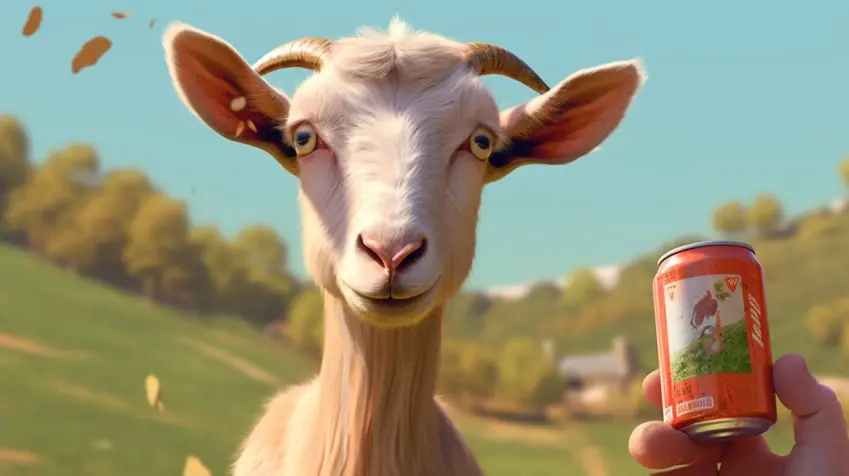
This process produces volatile fatty acids (VFAs), which serve as an energy source for the goat.
Maintaining a proper pH balance within the rumen is critical to ensuring proper digestion and overall health of the goat.
A balanced pH level allows for healthy bacteria to thrive and break down food efficiently, while an imbalanced pH level can lead to various digestive issues such as bloating or acidosis.
Because goats rely heavily on their rumen fermentation process, it’s important to carefully monitor their diet and ensure they consume appropriate foods that promote healthy digestion.
The Risks of Feeding Goats Soda
Feeding soda to ruminant animals can lead to severe toxicity concerns and behavioral changes.
Goats, in particular, have a sensitive digestive system that can be easily disrupted by the ingestion of carbonated beverages such as Sprite.
A study conducted by the University of Florida found that goats fed with soda had lower weight gain and reduced feed intake compared to those given water.
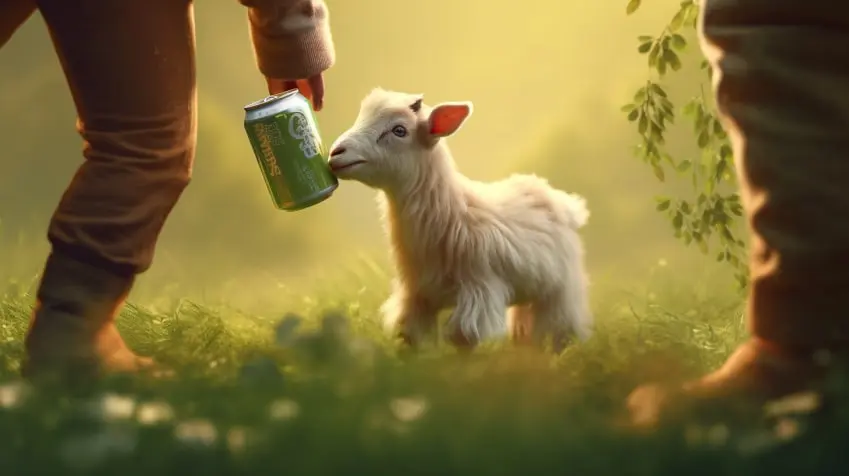
The research suggests that feeding goats soda could disrupt the microbial balance in their rumen, leading to digestive issues and decreased productivity.
Toxicity concerns are also present when it comes to feeding goats soda. Carbonated beverages contain high levels of sugar, caffeine, and other additives that can be harmful to these animals’ health.
Additionally, goats may become addicted to the sweet taste of soda and refuse other types of food or drink which are essential for their nutrition.
Therefore, it is crucial for goat owners or caretakers to avoid feeding them with any type of carbonated beverage since it poses significant risks on their overall well-being.
The Effects of Carbonation on Goats
The ingestion of carbonated beverages can have negative effects on the sensitive digestive system of ruminant animals, such as goats.
Carbonation toxicity occurs when an excessive amount of carbon dioxide is ingested by the animal, leading to respiratory issues due to the buildup of gas in their gastrointestinal tract.
Goats are particularly susceptible to this condition, as they have a complex digestive system that relies on a balance of microbes and enzymes to break down food.
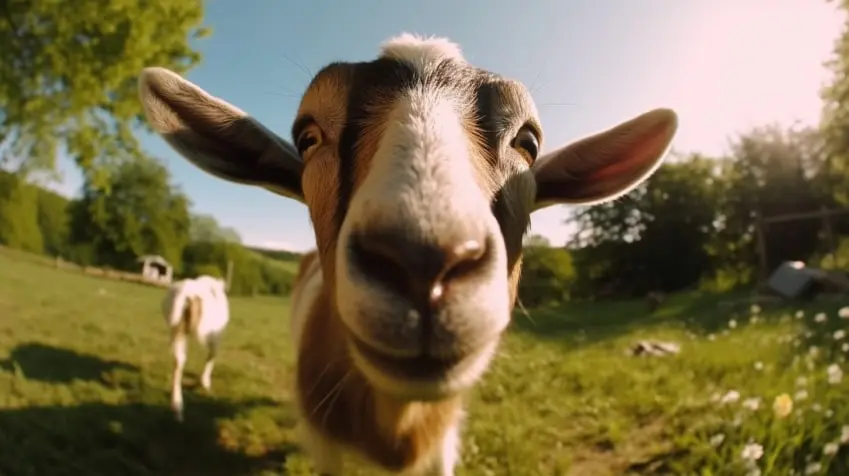
When goats consume carbonated drinks like Sprite, they may experience bloating, flatulence, abdominal pain, and diarrhea.
The carbon dioxide in these drinks can also cause respiratory distress in goats by creating pressure on their diaphragm and lungs.
Therefore, it is crucial for goat owners to avoid giving them any type of carbonated beverage and stick to offering them clean water and a balanced diet consisting of hay or pasture grasses supplemented with grains or pellets specifically formulated for goats.
The Impact of Sugar on Goats’ Health
Excessive consumption of sugar can have detrimental effects on the health and well-being of ruminants, including goats, as it disrupts their delicate digestive balance and may lead to metabolic disorders.
Here are some specific reasons why sugar consumption should be limited in goats:
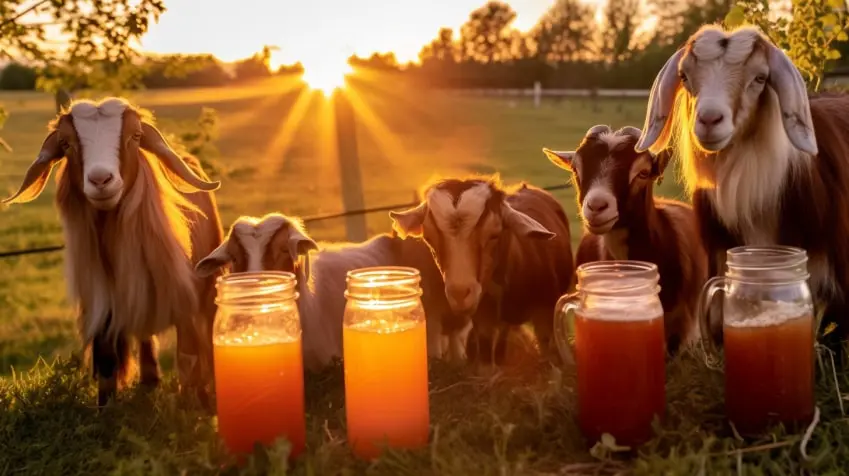
- Increased risk of obesity: Goats that consume diets high in sugar are at a greater risk for becoming overweight or obese. This can lead to additional health problems such as joint pain and reduced mobility.
- Digestive issues: The complex fermentation process that occurs in a goat’s rumen can be disrupted by excessive sugar intake, leading to diarrhea, bloating, or even acidosis.
- Dental problems: Just like humans, goats can develop dental issues from consuming too much sugar. Over time, sugary foods can erode tooth enamel and cause cavities.
- Reduced milk production: Dairy goats that consume too much sugar may experience a decrease in milk production due to the negative impact on their overall health.
Alternative Drinks for Goats
One option for diversifying a goat’s liquid intake is to consider alternative beverages.
While water should always be the primary source of hydration for goats, adding nutritious fruit juices to their diet can provide additional health benefits. Some popular options include apple juice, carrot juice, and beet juice.
Apple juice not only provides hydration but also contains vitamins A and C which can support immune function in goats.
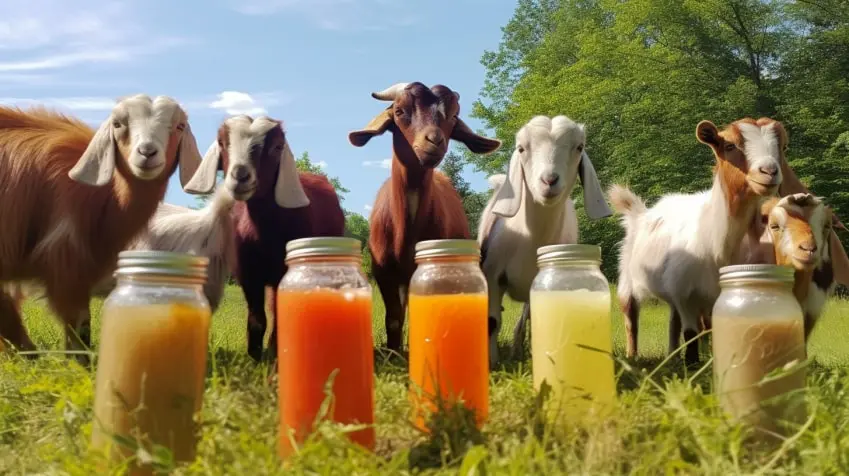
Carrot juice is another nutritious option as it contains high levels of vitamin A and antioxidants that can improve the overall health of goats.
Beet juice is also beneficial due to its high levels of iron, potassium, and magnesium which can help with blood circulation and muscle function in goats.
Incorporating these alternative drinks into a goat’s diet can enhance their hydration needs while providing them with important nutrients that support their overall health.
| Beverage | Nutrients | Benefits |
|---|---|---|
| Apple Juice | Vitamins A & C | Supports immune function |
| Carrot Juice | Vitamin A & Antioxidants | Improves overall health |
| Beet Juice | Iron, Potassium & Magnesium | Helps with blood circulation & muscle function |
Proper Nutrition for Goats
Just as a car needs fuel to run efficiently, ensuring proper nutrition for goats is essential for their growth and overall health.
Goats’ dietary needs vary depending on their age, weight, breed, and activity level. Thus, it is crucial to provide them with a well-balanced diet that meets their nutritional requirements.
Here are some points to keep in mind when it comes to feeding goats:
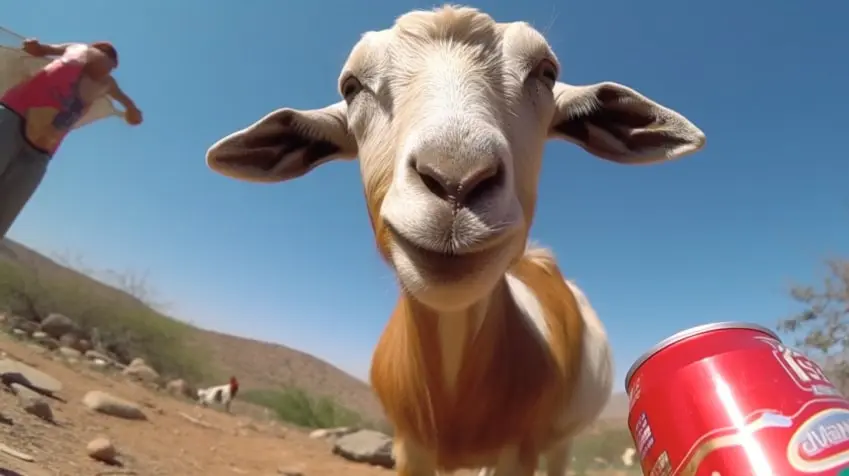
- Goats require high-quality forage such as hay or pasture grasses as the primary component of their diet
- A balanced mineral supplement should also be provided to ensure adequate intake of essential minerals
- Feeding schedules should be consistent and frequent throughout the day
- Overfeeding should be avoided as it can lead to obesity and other health issues
- Water must always be available and easily accessible.
In addition to these general guidelines, it is important to consult a veterinarian or animal nutritionist for specific recommendations based on your goat’s individual needs. Proper nutrition is key in maintaining your goat’s health and well-being.
Overall, providing goats with a healthy diet that meets their nutritional requirements is vital for their growth and development.
Consulting a Veterinarian for Advice
Consulting a veterinarian or animal nutritionist for specific recommendations based on individual goat needs is crucial in ensuring proper nutrition and overall health.
Goats, like any other animal, have unique requirements that may vary depending on their age, breed, sex, and activity level.
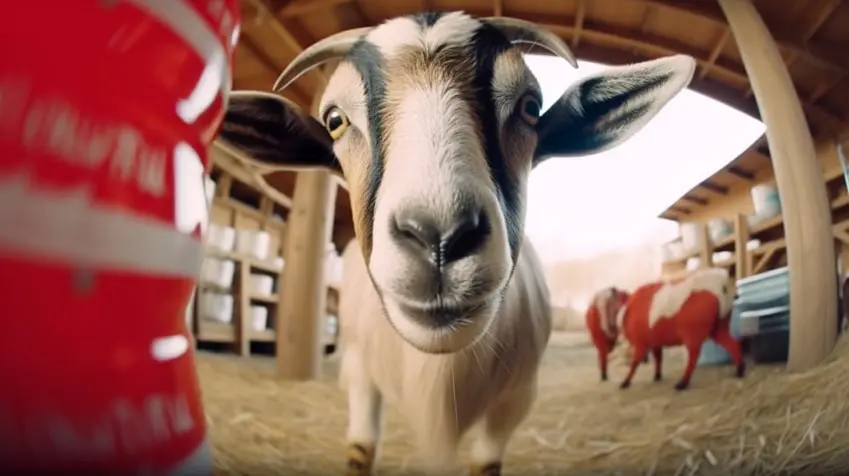
A professional can provide valuable guidance on how to create a balanced diet that meets all the necessary nutritional requirements while avoiding potential deficiencies or excesses of certain nutrients.
In addition to dietary advice, veterinarians can also offer guidance on the importance of hygiene and frequency of vet check-ups.
Maintaining good hygiene practices is essential in preventing infections and diseases from spreading among goats.
Regular check-ups are also important in detecting early signs of illness or disease before they become more serious problems.
| Importance of Hygiene | Frequency of Vet Check-Ups |
|---|---|
| Regular cleaning of barns, pens and equipment is important to minimize exposure to fecal matter and other sources of bacteria | Routine vet visits should occur at least once per year for preventative care such as vaccinations |
| Providing clean water sources helps prevent the spread of disease through contaminated water | Sick goats should be seen immediately by a vet to determine appropriate treatment |
| Proper disposal of manure is important in eliminating sources of infection | Pregnant goats require additional check-ups throughout their pregnancy to monitor fetal development |
| Quarantine procedures should be followed when introducing new animals to minimize risk of disease transmission | Aging goats may require more frequent check-ups as they become more prone to certain illnesses |
Frequently Asked Questions
What is the nutritional value of sprite for goats?
What is the nutritional value of sugary drinks like Sprite for goats? While there are no studies on this specific topic, it is generally recommended to avoid giving goats sugary drinks and opt for alternatives such as water or hay.
Can goats get addicted to drinking soda?
Research suggests that excessive consumption of soda can lead to addiction in goats and negatively impact their health. The high sugar content and artificial additives may cause obesity, dental problems, and metabolic disorders.
How much sprite can be given to goats without causing harm?
When considering hydration for goats, it is important to note the limitations of giving sugary drinks such as Sprite. Alternatives such as electrolyte solutions or fresh water should be considered to avoid potential harm.
Is it safe to give goats other carbonated drinks?
Carbonated drinks can cause bloating, discomfort and digestive issues in goats due to their sensitive digestive system. Alternatives like water, diluted fruit juice or electrolyte solutions are ideal for hydration without causing harm.
Can goats drink diet sprite?
While diet sprite may be low in sugar, it is not a suitable option for goats’ hydration. The dangers of soda for livestock include potential bloating and digestive issues. Alternatives to soda for goat hydration include fresh water and electrolyte solutions specifically formulated for animals.
Conclusion
Goats are fascinating creatures with unique digestive systems that require specific nutrition for optimal health.
While it may be tempting to offer goats a can of soda, it is not recommended as the risks outweigh any potential benefits.
Carbonation and sugar found in soda can have negative effects on goats’ health and well-being, including digestive issues, metabolic imbalances, and tooth decay.
It is crucial to provide goats with a balanced diet consisting of hay or grass, minerals, water, and possibly grain or supplements depending on their individual needs.
Consulting a veterinarian knowledgeable in goat health can help ensure proper nutrition and prevent potential health problems.
Alternative drinks such as electrolyte solutions or plain water may also be offered to promote hydration.
While the idea of offering a goat a refreshing drink like Sprite may seem harmless, it is important to consider the potential negative effects on their sensitive digestive system.
Proper nutrition through a balanced diet tailored to individual needs is essential for maintaining good goat health.
Remembering this will reduce the risk of harm from carbonated drinks and keep these delightful creatures happy and healthy!